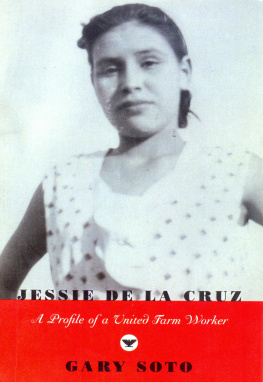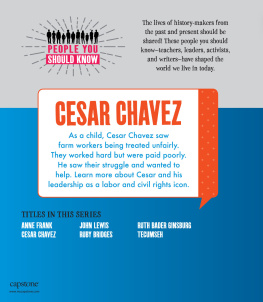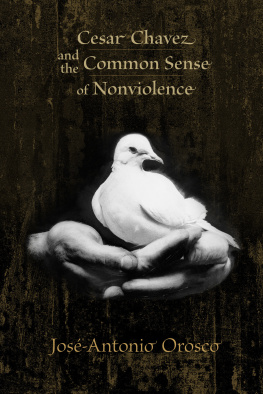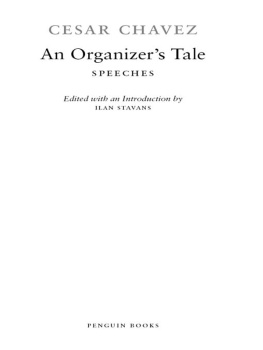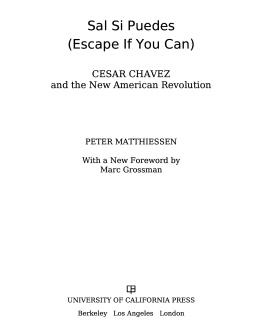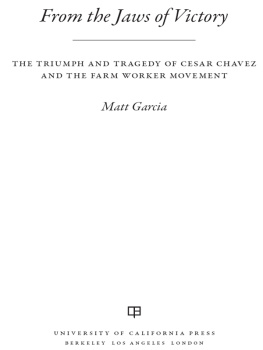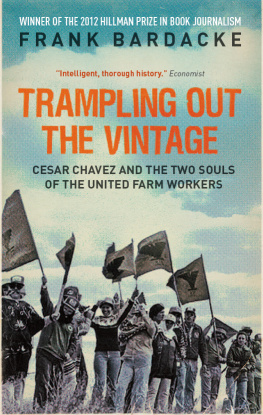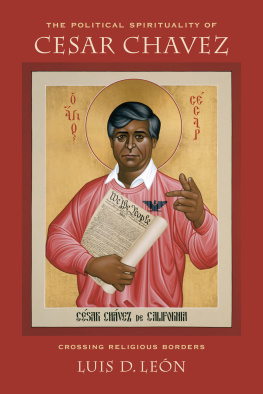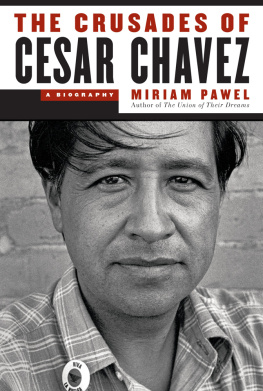If you purchased this book without a cover, you should be aware that this book is stolen property. It was reported as unsold and destroyed to the publisher, and neither the author nor the publisher has received any payment for this stripped book.
If you purchased this book without a cover, you should be aware that this book is stolen property. It was reported as unsold and destroyed to the publisher, and neither the author nor the publisher has received any payment for this stripped book.
Cesar Chavez A Hero for Everyone
GARY SOTO
ALADDIN PAPERBACKS
New York London Toronto Sydney Singapore
First Aladdin Paperbacks edition September 2003
Text copyright 2003 by Gary Soto
Illustrations copyright 2003 by Lori Lohstoeter
ALADDIN PAPERBACKS
An imprint of Simon & Schuster Childrens Publishing Division
1230 Avenue of the Americas
New York, NY 10020
www.SimonandSchuster.com
All rights reserved, including the right of reproduction in whole or in part in any form.
Also available in an Aladdin Library edition.
Designed by Debra Sfetsios
The text of this book was set in Cheltenham.
Manufactured in the United States of America
6 8 10 9 7
Library of Congress Control Number 2003103043
ISBN-13: 978-0-689-85922-9
ISBN-10: 0-689-85922-8
eISBN 978-1-439-10889-5
In memory of Peter Velasco
CHAPTER ONE Seeing for Himself
IN HIS 1953 Mercury station wagon, Cesar Chavez pulled into Corcoran, California. It was late summer, 1962. With a few other recruiters from the organization he would later call the National Farm Workers Association (NFWA), he was there to go door to door, telling farmworkers about a new union that would help them.
Corcoran was a small California valley town of about five thousand people. Most of these people were Mexican Americans. They were poor and often lived in barrios or labor camps. They worked in the fields that surrounded Corcoran, harvesting grapes in the summer and picking cotton in the fall.
Corcoran had a history of labor problems. In 1933 it had been the site of a farmworkers strike. The cotton pickers were paid by piecework. This meant that they didnt get paid by the hour but by how much they picked. The pickers were asking for better pay and fairness from the farmers, who occasionally cheated them. If you picked cotton, you dragged a sackor sacko, in Spanglishuntil it was so full it was too heavy to drag anymore. Then a farmer or his foreman would weigh the sack. Sometimes farmers would trick the workers with scales that werent properly balanced. Other times they might fire a worker for resting for ten minutes. This worker was usually fired at the end of the day, and he would only get a portion of his wages, never what he deserved.
Cesar was only six when the strike broke out, but later as young man he read and heard about it. He knew that the strikers had been beaten and shot and sometimes killed by armed farmers.
Cesar did have personal memories of Corcoran. When he was a boy, his family used to travel up and down Californias Central Valley looking for work. One summer, in the early 1940s, they stopped in Corcoran to pick cotton. But the contractor, the person who hired the workers and was responsible for paying them, ran off with their hard-earned money.
Now Cesar walked from house to house. He introduced himself in Spanish. He explained to the person who came to the doora man or woman who was tired from working in the fieldabout the desperate need for justice for the farmworker.
What is it you want? a man might ask.
Cesars answer would be that he wanted to start a movement to make life better for farmworkers.
By 1965 ChicanosMexican Americanswould call that movement simply, la causa, the cause to change how farmworkers were treated. The cause, also, to change how all Mexican Americans were treated in small rural towns and in the larger cities.
Viva la causa!would become the chant of the farmworker.
CHAPTER TWO Beginnings
CESARS DESIRE TO fight injustice probably started when he was ten years old. His family lost its 118-acre farm outside of Yuma, Arizona, when the Chavez family couldnt afford to pay the taxes they owed on it. His mother, Juana, may have influenced him. Every October 16 she honored St. Eduvigis, a Polish duchess, who gave away all her worldly goods to the poor. Or it may have begun with the stories of his very strong and hardworking grandfather, Cesario, for whom he was named. Cesario had escaped in the late 1880s from a hacienda in the Mexican state of Chihuahua. All of these influences created at the core of Cesars heart a tenderness for the poor.
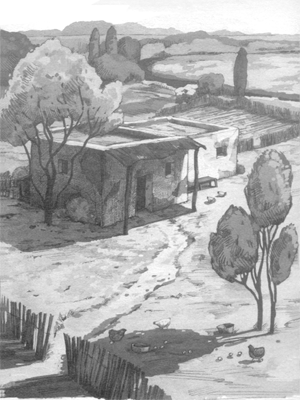
Cesar was born on March 31, 1927, upstairs from the Chavez family store. The store sold food and other items that farmers and farmworkers needed to work the land. But because business was slow, Cesars father, Librado, had to sell his store. Cesar was five at the time. The family moved back to the farm that Cesars grandfather Cesario, also known as Papa Chayo, had home-steaded for more than three decades. There they raised cotton but also had small plots of watermelon, corn, squash, and chilies. Chickens roamed in the shade of their adobe house.
Cesar rose early to do his chores and then trudged along with his sister, Rita, and brother, Richard, to a three-room schoolhouse. This was especially hard in winter when Cesar had nothing warmer to wear than a sweater.
School was an unwelcoming place. He wasnt allowed to speak Spanish, the familys household language. In fact speaking it brought on punishment. All Cesar would remember of school was the whistling of the ruler as it came down on his wrist or knuckles.
Cesar and Richard werent above playing hooky. Once when the two boys skipped school, the principal drove to their home and reported them. They thought the desert was hot, but not nearly as hot as their bottoms after their father found out.
When the children werent in school, they played in the trees with their homemade toys and made stick bridges over streams of water carved from the irrigation canals. They also helped in the fields. In spring they chopped cotton with a hoe. They then picked it in September. There were plenty of chores, and Cesar, like most children, complained to his father more than once. What child wouldnt complain about having to wake up at four in the morning to pick cotton on days when the temperature would rise to 110 degreeseven in the shade!
During the 1930s the whole country was suffering from the Great Depression. The average person didnt have enough money to live. There were few jobs. People went hungry.
As the Depression got worse, Cesar and Richard took baskets of eggs to neighbors and traded them for flour or cornmeal. In normal times the family could get five or six cents for a dozen eggs. But now no one, especially farmers, had any money jingling in their pockets. Because no one had money, neighbors did a lot of trading of goods. If a neighbors goat was butchered, the Chavez family might get some of the meat in exchange for what they grew.
With millions out of work the mood of the country changed. It was certainly felt by the Chavez family. Things got worse when the North Gila Valley, where their farm was, suffered a drought. It seldom rained even in normal seasons. Everyone grew worried when their life source, the canal that ran in front of their house, shriveled to a trickle.
Cesar saw deep worry lines in his fathers face. How would they live? It was about this time that Cesar and Richard got their first paying job. They hunted the gophers that not only harmed the local crops but also ruined the walls of the irrigation canals. For each gopher they trappedthey had to show the tail of the dead gopherthey got a penny.
Next page

